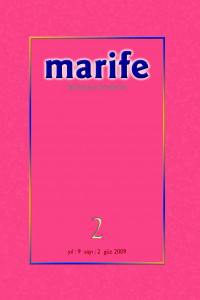A Far East Commentator Muhammad b.Omar An-Nawavî His Life and General Characteristics of Commentary Marâhu Labîd
Abstract
Indonesian scholar Muhammad b. Omar al-Nawawi (1230/1815-1316/1898), studied in his home country till he was about thirty year’s old, then migrated to Mecca and continued his education. For a short time, he also visited Syria and Egypt and he attained extensive knowledge in Islamic studies. Nawawi, who became famous for writing commentaries on tens of books in almost every field of Islamic studies, wrote his two volume exegesis Marâhu labîd. The author, who was loyal to the traditional methods of exegesis, followed the Shafi’ite school. Even though he sometimes gave place to the narratives from the Bible and apoc-ryphal stories, he employs a clear, smooth and perceptible language in his com-mentary. He comments on every single verse in the Qur’an, in addition to his ex-planations related to the methodology of Qur’anic exegesis, e.g. muhkam-mutashābih (Clear and allegorical verses), nasih-mensūh (abrogating and abrogat-ed verses); He especially dealt with different versions of recitation and reasons for revelation.
Keywords
Nawawi Marâhu Labîd Exegesis Narrative Exegesis Rational Exegesis Biblical Stories Allegorical Abrogation Salafi School Reasons For Revelation And Sufi Com-Mentary
References
- Ahmed b. Hanbel, Müsned, İstanbul, 1992.
- Ahmet Saim Kılavuz, “Sıfat”, İnanç, İbadet ve Günlük Yaşayış Ansiklopedisi (ed. İbrahim Kafi Dönmez), İstanbul, 2006.
- Aliyyü’lKârî, Ebu’lHasen Nureddin, Şerhu kitâbi’lFıkhi’lekber, Beyrut, 1984.
- Anthony H. Johns, “Quranic Exegesis in the Malay World: In Searh of a Profile”, in Approaches to the History of the Interpretation of th Quran (Edid by Andrew Rippin), Oxford, 1998.
- Bağdatlı İsmail Paşa, Îzâhu’lmeknûn, Ankara, 1972.
- Bağdatlı İsmail Paşa, Hediyyetü’l-‘ârifîn, İstanbul, 1990.
- Bekir Topaloğlu, Kelama Giriş, İstanbul, 1988.
- Beyâzîzâde Ahmed Efendi, İşârâtü’l-merâm min ‘ibârâti’l-imâm (thk. Yusuf Abdurrezzak), Kahire, 1949.
- Carl Brockelmann, “Navavî”, İA, İstanbul, 1988.
Bir Uzakdoğu Müfessiri Muhammed b. Ömer En-Nevevî’nin Hayatı ve Merâhu Lebîd Adlı Tefsirinin Genel Özellikleri
Abstract
Endonezya asıllı âlim Muhammed b. Ömer en-Nevevî (1230/1815-1316/1898), otuz küsur yaşına kadar ülkesinde ilim öğrenmekle meşgul olmuş, da-ha sonra Mekke’ye hicret edip orada ilim tahsil etmiş, kısa bir süre de Mısır ve Suri-ye’de bulunmuş ve İslamî ilimlerde geniş bir bilgi birikimi elde etmiştir. İslamî ilim-lerin hemen her alanına ait onlarca esere şerh yazmakla şöhret bulan Nevevî, telif olarak da Merâhu lebîd adında orta hacimde iki ciltlik bir tefsir kaleme almıştır. Tef-sirinde geleneksel tefsir anlayışına sadık kalan müellif, Ehl-i sünnet-Şafiî çizgisini takip etmiş, yorumlarında bir kısım isrâiliyata ve uydurma rivayetlere yer vermekle beraber, üslup olarak akıcı, sade, anlaşılabilir bir dil kullanmış, hiçbir âyeti atlama-yarak her âyeti ayrı ayrı tefsir etmiş; bunun yanında muhkem-müteşâbih, nâsih-mensûh gibi usûl konularına değinmiş, kıraatlere ve esbâb-ı nüzûle ise özellikle yer vermiştir.
Keywords
Nevevî Merâhu Lebîd Tefsir Rivâyet Dirâyet İsrâiliyyat Müteşâbih Nesh Selefîlik Esbâb İşarî Yorum
References
- Ahmed b. Hanbel, Müsned, İstanbul, 1992.
- Ahmet Saim Kılavuz, “Sıfat”, İnanç, İbadet ve Günlük Yaşayış Ansiklopedisi (ed. İbrahim Kafi Dönmez), İstanbul, 2006.
- Aliyyü’lKârî, Ebu’lHasen Nureddin, Şerhu kitâbi’lFıkhi’lekber, Beyrut, 1984.
- Anthony H. Johns, “Quranic Exegesis in the Malay World: In Searh of a Profile”, in Approaches to the History of the Interpretation of th Quran (Edid by Andrew Rippin), Oxford, 1998.
- Bağdatlı İsmail Paşa, Îzâhu’lmeknûn, Ankara, 1972.
- Bağdatlı İsmail Paşa, Hediyyetü’l-‘ârifîn, İstanbul, 1990.
- Bekir Topaloğlu, Kelama Giriş, İstanbul, 1988.
- Beyâzîzâde Ahmed Efendi, İşârâtü’l-merâm min ‘ibârâti’l-imâm (thk. Yusuf Abdurrezzak), Kahire, 1949.
- Carl Brockelmann, “Navavî”, İA, İstanbul, 1988.
Details
| Primary Language | Turkish |
|---|---|
| Subjects | Religion, Society and Culture Studies |
| Journal Section | Research Article |
| Authors | |
| Publication Date | September 30, 2009 |
| Published in Issue | Year 2009 Volume: 9 Issue: 2 |
This work is licensed under a Creative Commons Attribution-NonCommercial 4.0 International License.

